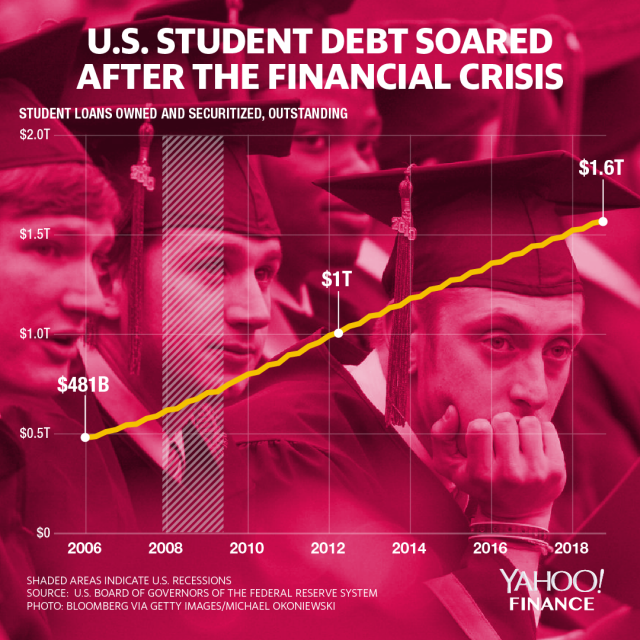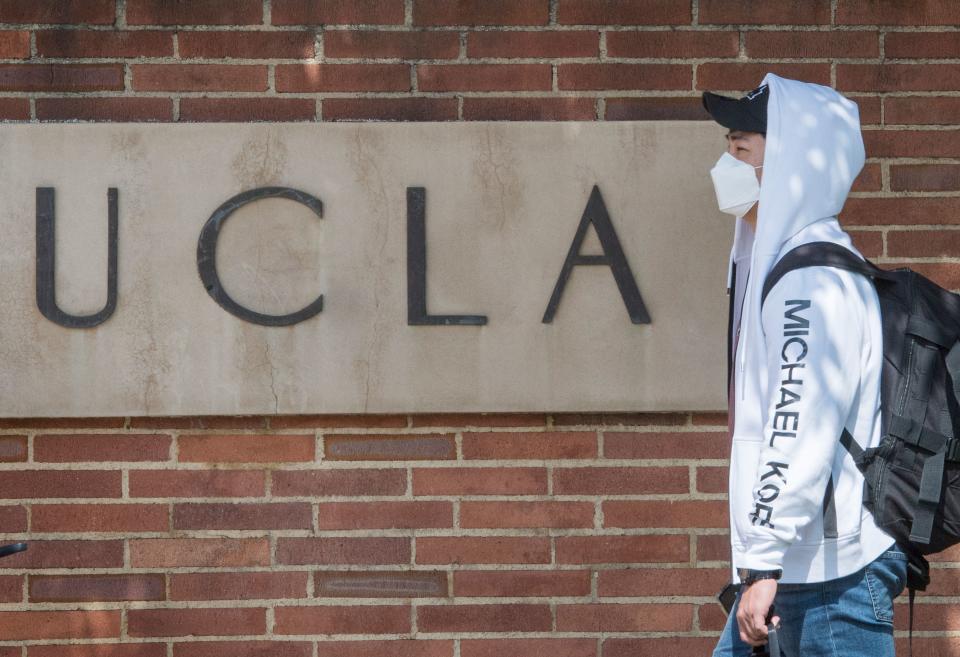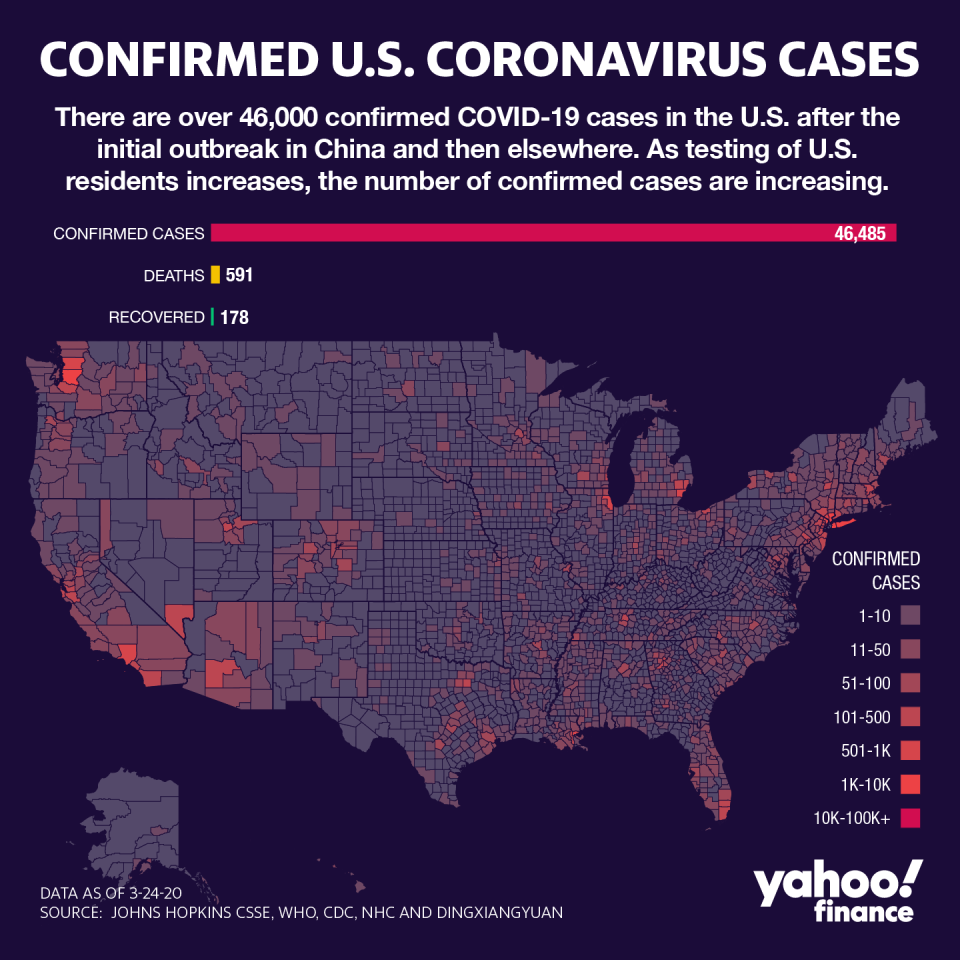Coronavirus shutdown: Consumer advocates worry about $100 billion private student loan market
As Democrats call for aid to assist federal student loan borrowers affected by the coronavirus, or COVID-19, consumer advocates worry about those holding private loans.
“When we are talking about how student loan borrowers are impacted by this crisis, we can’t lose sight of the millions of borrowers with private student loans,” Seth Frotman, former student loan ombudsman at the Consumer Financial Protection Bureau, told Yahoo Finance. “The private student loan market is overshadowed by the enormous federal student market… [but] in its own right is more than $100 billion.”
Presently there are more than 43 million Americans with $1.5 trillion in student loan debt. Federal loans form $1.3 trillion of that, and as Frotman indicated, a sizable portion of the remainder comprise of private education loans.
Currently, the Education Department has set interest rates to zero for those holding federal student loans and suspended the collection on defaulted loans. Additionally, federal borrowers can apply for penalty-free forbearance for a period of time, as per the department’s guidance.
But thus far, private loans have been largely left out of the picture.

“There’s more private student loan debt than payday loans in America… than medical debt in collections,” Frotman, who now runs the Student Borrower Protection Center, stressed. “And these borrowers have been hurting. And I’m really worried about them as we face this new financial crisis.”
Generally, “it is more challenging to help with the private credit product, whether you’re talking about student loans or credit cards or mortgages,” James Kvaal, president of the Institute for College Access and Success, told Yahoo Finance. “For federal loans, there’s a great deal of control over the terms of those loans and it’s much quicker and easier for the federal government to offer relief.”
Navient, the largest U.S. student loan servicer, acknowledged that the 0% interest rate on federal loans automatically applied as a result of the Department of Education’s announcement does not apply to private loans.
The company noted that private loan borrowers can request for three months of “disaster forbearance” and suggested that some borrowers could request a temporary interest rate reduction program to lower the monthly payment amount.

‘What private student loan borrowers are about to face now is truly petrifying’
Meanwhile, there’s a question regarding the status of certain lawsuits filed against student debtors who are unable to pay back their private loans.
“One of the most outrageous things that I have seen over the last two weeks is how some of the largest players ... have been trying to haul borrowers into court to collect on debt, even after the president declared a national emergency,” Frotman explained.
For example, in one case shared with Yahoo Finance, as the number of coronavirus cases started to increase in New York, “SLM Private Education Loan Trust 2012-C,” took legal action against a borrower who owed nearly $60,000 in Far Rockaway, Queens, New York on March 9.
🎴Six more cases were filed YESTERDAY by @Navient and #NCSLT trying to drag #studentloan borrowers into court in NY the middle of a #pandemic 🎴
Yet RIGHT NOW, @Navient is pleading w/ judges across the country to dismiss borrowers' lawsuits against them b/c of #COVID19. pic.twitter.com/3lnUYxelXr— Seth Frotman (@sethfrotman) March 17, 2020
That trust is owned or managed by Navient, as per Navient’s records. It’s essentially an asset-backed security (ABS) that’s backed by a pool of private student loans. The trust makes money from collecting on those loans, as per an SEC filing from 2012.
According to the suit, the borrower was in default and was summoned to answer the complaint in the action “within 20 days.” If the borrower fails to answer, it would have resulted in default judgement, which could then lead to situations like wage garnishment.
And since the borrower received the papers, the number of cases of people with the coronavirus infection in New York has exploded.
While people around the world are being asked to #StayAtHome #NCSLT continues to drag borrowers into court, filing TWELVE lawsuits yesterday in NY alone. This puts everyone at risk and is exacerbating the #studentdebtcrisis. It must end now. #protectborrowers pic.twitter.com/hIPyD5q3Dl
— Seth Frotman (@sethfrotman) March 18, 2020
“What private student loan borrowers are about to face now is truly petrifying,” Frotman said. “We’ve seen just highly predatory … practices by the student loan industry, going after the most vulnerable borrowers from filing lawsuits against [them] where they can’t even prove they have the documents, aggressive collection tactics.”
Frotman’s team found at least 20 cases of student loan companies — both Navient and National Collegiate Student Loan Trusts — filing lawsuits over student debt recently.
It’s unclear whether the lenders intentionally filed these lawsuits with malicious intent to catch debtors during a pandemic. Navient spokesperson Paul Hartwick also emphasized that Navient has not been filing new cases right now, and has not done so for “more than a week.”
In any case, a filing from March 19 in Maryland shows that it’s still litigating existing lawsuits. And those that have already been filed remain on the record, which has consequences for borrowers, one lawyer asserted.

"There may be an explanation for this, but the problem with things like this is that in six months, or five years, or 20 years, when we are beyond this crisis, that lawsuit will remain part of the record,” Austin Smith, an attorney specializing in student debt and bankruptcy at Smith Law Group, told Yahoo Finance. “And when the debt is sold or transferred to somebody else, somebody will dig up that lawsuit and find a way to use it against the debtor.”
The coronavirus outbreak could suspend the litigation indirectly by forcing the courts to close. The New York State Court System, citing the severity of the outbreak in the state, shuttered all courts except those that are addressing “essential and critical needs of the public.” However, it’s unclear if all legal action regarding debt collection has been suspended or other provisions have been made.
—
Aarthi is a writer for Yahoo Finance. She can be reached at aarthi@yahoofinance.com. Follow her on Twitter @aarthiswami.
Read more:
House Democrats unveil bill to cancel $30,000 in student debt per borrower amid coronavirus
Coronavirus student loan relief: Education Department says borrowers can ask for a payment pause
Biden backs Democrats' student debt cancellation push amid coronavirus outbreak
Read the latest financial and business news from Yahoo Finance
Follow Yahoo Finance on Twitter, Facebook, Instagram, Flipboard, SmartNews, LinkedIn, YouTube, and reddit.

 Yahoo Finance
Yahoo Finance 
